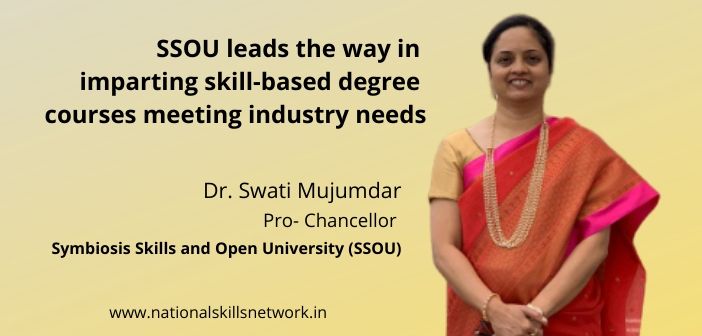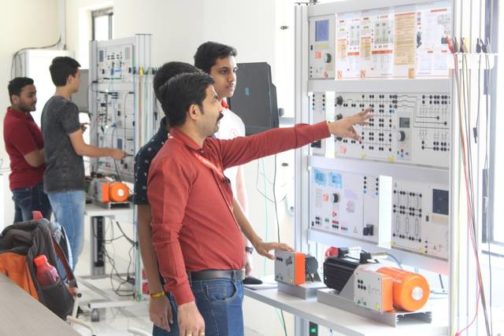A degree in Port Management, or in Beauty and Wellness, the Symbiosis Skills and Open University (SSOU) has many innovative industry-driven courses on their list. The focus of these programs is on applying knowledge and acquiring employable skills. To learn more about how the university is conceptualized and their roadmap for future, we present their Skill Story with excerpts from a conversation with Dr Swati Mujumdar, Pro-Chancellor, SSOU and Symbiosis University of Applied Sciences (SUAS). Let’s get started with the story of SSOU.
Q: How did you arrive at the concept of combining skill-based education and training and an open university for SSOU.
A: This was when I was appointed as Chairperson of Maharashtra Government Vocational Education Committee to research and draft the state policy in this regard in 2008 – 2010. And during my research found that students don’t really aspire to go for vocational education. We interviewed thousands of students as well as vocational teachers and we realized that students choose vocational courses as their last option.
We also realized that most of the vocational courses are terminal in nature, so there is no vertical mobility from Certificate to Diploma to Degree. Students attach a lot of value to degree, they are not motivated or find it aspirational to go for skill-based courses that don’t lead to a degree.
Q: How are SSOU and SUAS different or similar as universities? It would be nice to know about the model and its outcomes.
A: We conceptualized the skill university and launched the first one in 2016 in Indore, Madhya Pradesh. The university is modelled on the German university of Applied Sciences that are basically vocational universities. And, subsequently Symbiosis Skills and Open University (SSOU), Pune, was inaugurated in 2017.
Our objective is to motivate students to go for skill-based courses, and encourage them to take up vocational education. We want to provide the courses in such a manner that they can be gainfully employed or self-employed.
Initially, we started with the concept of open university because we also wanted to offer distance learning courses but due to some UGC requirements, this could not be done. Through SSOU, we offer full-time courses, along with residential facilities. Soon, we propose to change the name of SSOU to Symbiosis Skills and Professional University.
 Q: What about the industry connect? How do companies in various industry sectors partner to offer work-integrated courses.
Q: What about the industry connect? How do companies in various industry sectors partner to offer work-integrated courses.
 A: We work with the industry to find out the areas in which skilled manpower is required and then we prepare the curriculum along with them and do a reverse engineering. This involves categorizing the curriculum as a certificate, a diploma or a degree. If the curriculum is suitable for a certificate course, we offer a certificate, or one-year diploma, in the longer term, we offer a degree. All our courses are industry sector- specific. So, from day one students take courses that are relevant to the industry requirements like a B.Sc in Data Science. You will find industry experts on our Board of Studies and Academic Council as well.
A: We work with the industry to find out the areas in which skilled manpower is required and then we prepare the curriculum along with them and do a reverse engineering. This involves categorizing the curriculum as a certificate, a diploma or a degree. If the curriculum is suitable for a certificate course, we offer a certificate, or one-year diploma, in the longer term, we offer a degree. All our courses are industry sector- specific. So, from day one students take courses that are relevant to the industry requirements like a B.Sc in Data Science. You will find industry experts on our Board of Studies and Academic Council as well.
Both in Indore and Pune, in the Engineering stream, we offer B.Tech programs in Automobile and Mechatronics, Construction and Infrastructure. In the Management stream we offer BBA degree in Retail Management and in Logistics and Supply Chain Management. We also offer B.Sc in Beauty and Wellness, and we have courses in Architecture and Urban Planning.
The industry doesn’t want Mechanical Engineers, but they want Engineers specialized in Automotive Engineering; same is the case with Data Science. In Beauty and Wellness sector, there was no course in India that offered a 3-year skill-based Degree program. This program is designed in collaboration with Beauty Sector Skill Council, and students get to practice hands-on skills in Yoga, Meditation, Diet, Nutrition. A course on Ports Management is a good example of how we included an industry-driven curriculum in topics like managing internal external terminals and import export elements in managing ports.
Related article: Roundtable on Skill Development for Electric Vehicles organized by DFID, ASDC and SSOU – Read more: https://nationalskillsnetwork.in/roundtable-on-skill-development-for-electric-vehicles-organized-by-dfid-asdc-and-ssou/
Q: What are some of the popular courses and how are the faculty trained to deliver the same.
A: Data science and AI courses are very popular, followed by Mechatronics, because there’s electronics in every industry now! Courses in Beauty and Wellness, Logistics and Retail Management also attract students because these are industry sector-specific specialized courses.
Another unique feature is that in our university, we’ve created Centers of Excellence, where we’ve simulated the entire work environment in the campus, For Retail we have a CoE set up by Shoppers Stop where students can practice pricing, floor layout, customer interaction, visual merchandizing. And in Beauty and Wellness, we have collaborated with Enrich Salons. They’ve set up a Beauty Training Academy where students can practice hair treatment, make up and other services In Engineering we’ve procured specialized skill training equipment from Germany to train students on electric vehicles, other automobile and mechatronics.
To ensure industry-exposure and experience in teachers, first, at the time of recruitment we look for faculty who are from the industry or have industry experience. Second, we conduct many ToT programs to teach them how to deliver skill-based pedagogy. Third, we also invite people from the industry to train the students and fourth, in the time table, we’ve included a skill class, so, for every topic of the curriculum we have a lecture and practicals.
Q: What are the initiatives undertaken to bring about a change in the thought process or mindset of students, parents and others to attract them to vocational higher education.
A: A degree like B.Voc has not received the recognition and respect from the parents or the industry, so we had to started with BBA program. However, we’ve vocationalized the entire curriculum to ensure that the students get skilled. Parents and students need to be convinced that they can make a career in skill-based education. Industry also has to change their recruitment laws and rules to give preference to students who have vocational certification. If the parents start to see that vocationally certified students get better salaries than regular students then they would spread the word and more parents would send their children.












